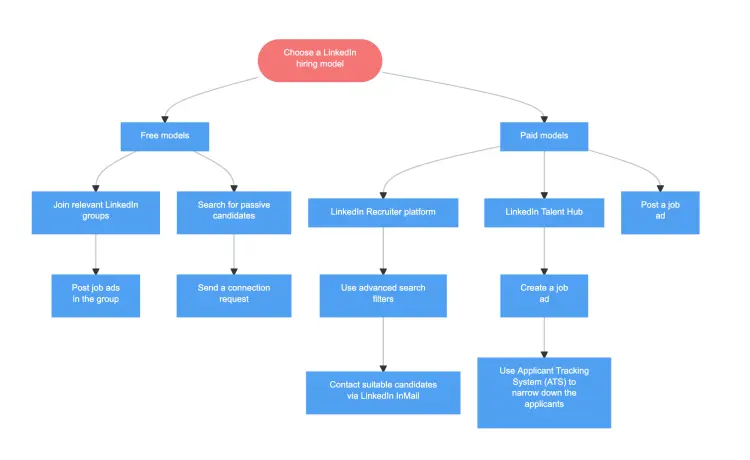The flowchart starts with choosing a hiring model through LinkedIn. We have two options: Free and paid models. Free models include joining relevant LinkedIn groups and posting a job ad in the group and searching for passive candidates. We send these candidates a connection request. There are three paid hiring models available on LinkedIn. The first one is the LinkedIn recruiter platform, which allows usage of advanced search filters and contacting the relevant candidates via LinkedIn InMail. The second option is the LinkedIn Talent Hub platform, which includes job ad creation possibilities and usage of the Applicant Tracking System (ATS) to narrow down the applicant list. The last paid option is a simple job ad post.
Check out LinkedIn hiring process flowchart explained.

Edit this diagram in Gleek
LinkedIn recruitment models diagram code in Gleek
Choose a LinkedIn hiring model:queue
Choose a LinkedIn hiring model–>Free models
Choose a LinkedIn hiring model–>Paid models
Free models–>Join relevant LinkedIn groups
Free models–>Search for passive candidates
Paid models–>LinkedIn Recruiter platform
Paid models–>LinkedIn Talent Hub
Paid models–>Post a job ad
Join relevant LinkedIn groups–>Post job ads in the group
Search for passive candidates–>Send a connection request
LinkedIn Recruiter platform–>Use advanced search filters
Use advanced search filters–>Contact suitable candidates via LinkedIn InMail
LinkedIn Talent Hub–>Create a job ad
Create a job ad–>Use Applicant Tracking System (ATS) to narrow down the applicants
About Flowcharts
A flowchart, or flow chart, is a type of diagram that shows a step-by-step view of a process. Flowcharts document the tasks and decisions needed to achieve a specific goal. A basic flowchart is easy to make and understand. Businesses, engineers and software designers often use flowcharts to diagram their ideas.
Similar flowchart examples
LinkedIn job ad creation flowchart
Talent acquisition process flowchart
LinkedIn Hiring process flowchart